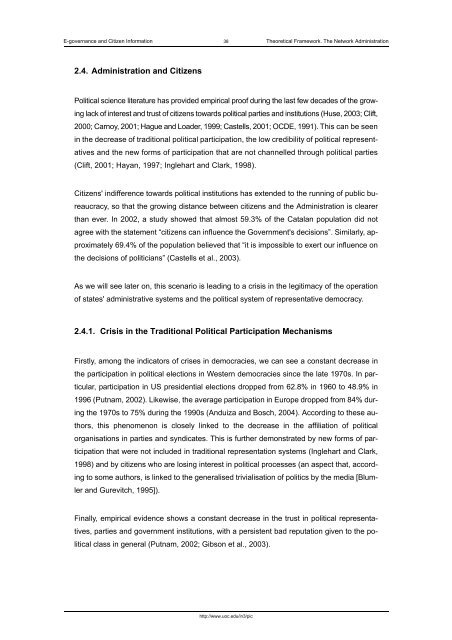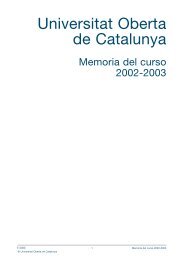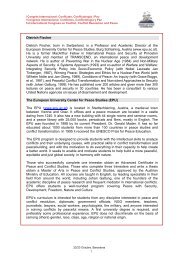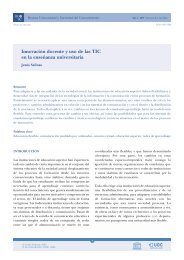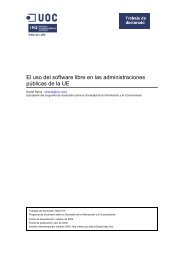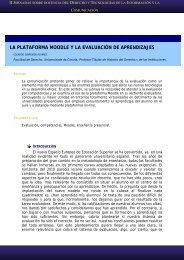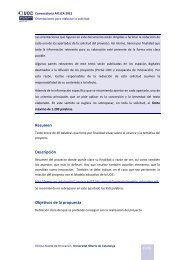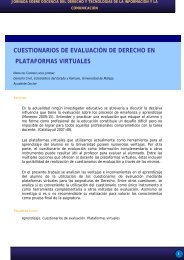e-governance and citizen information - Universitat Oberta de ...
e-governance and citizen information - Universitat Oberta de ...
e-governance and citizen information - Universitat Oberta de ...
Create successful ePaper yourself
Turn your PDF publications into a flip-book with our unique Google optimized e-Paper software.
E-<strong>governance</strong> <strong>and</strong> Citizen Information 38 Theoretical Framework. The Network Administration2.4. Administration <strong>and</strong> CitizensPolitical science literature has provi<strong>de</strong>d empirical proof during the last few <strong>de</strong>ca<strong>de</strong>s of the growinglack of interest <strong>and</strong> trust of <strong>citizen</strong>s towards political parties <strong>and</strong> institutions (Huse, 2003; Clift,2000; Carnoy, 2001; Hague <strong>and</strong> Loa<strong>de</strong>r, 1999; Castells, 2001; OCDE, 1991). This can be seenin the <strong>de</strong>crease of traditional political participation, the low credibility of political representatives<strong>and</strong> the new forms of participation that are not channelled through political parties(Clift, 2001; Hayan, 1997; Inglehart <strong>and</strong> Clark, 1998).Citizens' indifference towards political institutions has exten<strong>de</strong>d to the running of public bureaucracy,so that the growing distance between <strong>citizen</strong>s <strong>and</strong> the Administration is clearerthan ever. In 2002, a study showed that almost 59.3% of the Catalan population did notagree with the statement “<strong>citizen</strong>s can influence the Government's <strong>de</strong>cisions”. Similarly, approximately69.4% of the population believed that “it is impossible to exert our influence onthe <strong>de</strong>cisions of politicians” (Castells et al., 2003).As we will see later on, this scenario is leading to a crisis in the legitimacy of the operationof states' administrative systems <strong>and</strong> the political system of representative <strong>de</strong>mocracy.2.4.1. Crisis in the Traditional Political Participation MechanismsFirstly, among the indicators of crises in <strong>de</strong>mocracies, we can see a constant <strong>de</strong>crease inthe participation in political elections in Western <strong>de</strong>mocracies since the late 1970s. In particular,participation in US presi<strong>de</strong>ntial elections dropped from 62.8% in 1960 to 48.9% in1996 (Putnam, 2002). Likewise, the average participation in Europe dropped from 84% duringthe 1970s to 75% during the 1990s (Anduiza <strong>and</strong> Bosch, 2004). According to these authors,this phenomenon is closely linked to the <strong>de</strong>crease in the affiliation of politicalorganisations in parties <strong>and</strong> syndicates. This is further <strong>de</strong>monstrated by new forms of participationthat were not inclu<strong>de</strong>d in traditional representation systems (Inglehart <strong>and</strong> Clark,1998) <strong>and</strong> by <strong>citizen</strong>s who are losing interest in political processes (an aspect that, accordingto some authors, is linked to the generalised trivialisation of politics by the media [Blumler<strong>and</strong> Gurevitch, 1995]).Finally, empirical evi<strong>de</strong>nce shows a constant <strong>de</strong>crease in the trust in political representatives,parties <strong>and</strong> government institutions, with a persistent bad reputation given to the politicalclass in general (Putnam, 2002; Gibson et al., 2003).http://www.uoc.edu/in3/pic


